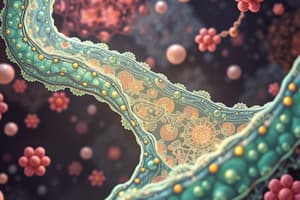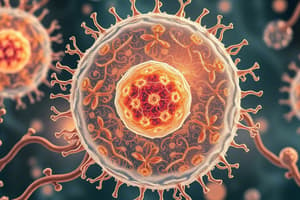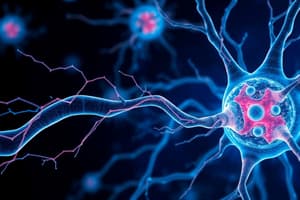Podcast
Questions and Answers
What is the correct order of a negative feedback loop's function?
What is the correct order of a negative feedback loop's function?
- Change in physiology drives critical physiological factor back to normal levels (correct)
- Detection of a change in a critical physiological factor (correct)
- Signal sent to effector cell (correct)
- Effector cell causes change in physiology (correct)
How do unsaturated fatty acids affect the fluidity of the cell membrane?
How do unsaturated fatty acids affect the fluidity of the cell membrane?
- Unsaturated fatty acids interact with integral membrane proteins more effectively than saturated fatty acids.
- Unsaturated fatty acids increase the fluidity of the cell membrane. (correct)
- Unsaturated fatty acids decrease the fluidity of the cell membrane.
- It wouldn’t have any notable effect.
Which of the following statements correctly compares the lysosome and the proteasome?
Which of the following statements correctly compares the lysosome and the proteasome?
- The proteasome degrades proteins using enzymes. (correct)
- The lysosome constructs free fatty acids used in the cell.
- The proteasome is designed to break down all four types of biomolecules with enzymes and acid.
- The lysosome breaks down all four types of biomolecules with enzymes and acid. (correct)
Energy release from ATP occurs through which process?
Energy release from ATP occurs through which process?
What is the most effective way to counteract forgetting?
What is the most effective way to counteract forgetting?
Which mode of cell signaling occurs between closely situated nerve cells?
Which mode of cell signaling occurs between closely situated nerve cells?
Which characteristics of oxygen make it membrane permeable?
Which characteristics of oxygen make it membrane permeable?
Which of the following is NOT part of the ribosome complex during protein synthesis?
Which of the following is NOT part of the ribosome complex during protein synthesis?
What is the primary function of gene transcription?
What is the primary function of gene transcription?
Which biomolecule primarily serves as the main source for long-term energy storage?
Which biomolecule primarily serves as the main source for long-term energy storage?
What characterizes a hypertonic solution?
What characterizes a hypertonic solution?
Which of the following is NOT classified as a major tissue type in the human body?
Which of the following is NOT classified as a major tissue type in the human body?
What is the correct anatomical term for the body's position with feet parallel and palms outward?
What is the correct anatomical term for the body's position with feet parallel and palms outward?
Which molecule forms the basic building blocks of proteins?
Which molecule forms the basic building blocks of proteins?
Where are chaperone proteins predominantly found in a cell?
Where are chaperone proteins predominantly found in a cell?
Which type of muscle tissue is under voluntary control?
Which type of muscle tissue is under voluntary control?
What type of receptor signaling do hormones primarily utilize?
What type of receptor signaling do hormones primarily utilize?
Which statement about channel proteins is true?
Which statement about channel proteins is true?
How does neuroplasticity primarily occur in the nervous system?
How does neuroplasticity primarily occur in the nervous system?
Which type of junction is responsible for preventing molecules from passing from one cell to another?
Which type of junction is responsible for preventing molecules from passing from one cell to another?
Which nitrogenous base pairing is NOT found in DNA?
Which nitrogenous base pairing is NOT found in DNA?
What does a positive feedback loop generally do to a physiological factor?
What does a positive feedback loop generally do to a physiological factor?
Flashcards
Negative feedback loop order
Negative feedback loop order
A negative feedback loop works by detecting a change in a physiological factor, sending a signal to an effector cell, which then causes a change in physiology that drives the critical factor back to normal levels.
Impact of unsaturated fatty acids on membrane fluidity
Impact of unsaturated fatty acids on membrane fluidity
Unsaturated fatty acids have double bonds that create kinks in the tails, increasing the fluidity of the cell membrane, allowing for better movement.
Lysosome function
Lysosome function
Lysosomes are responsible for breaking down all four types of biomolecules using enzymes and acid.
ATP energy release
ATP energy release
Signup and view all the flashcards
Best tool to offset forgetting
Best tool to offset forgetting
Signup and view all the flashcards
Signaling between nerve cells
Signaling between nerve cells
Signup and view all the flashcards
Oxygen permeability
Oxygen permeability
Signup and view all the flashcards
Component of ribosome complex
Component of ribosome complex
Signup and view all the flashcards
Gene Transcription
Gene Transcription
Signup and view all the flashcards
Gene Translation
Gene Translation
Signup and view all the flashcards
Lipids
Lipids
Signup and view all the flashcards
Interstitial Fluid
Interstitial Fluid
Signup and view all the flashcards
Hypertonic Solution
Hypertonic Solution
Signup and view all the flashcards
Major Tissue Types
Major Tissue Types
Signup and view all the flashcards
Thoracic Cavity
Thoracic Cavity
Signup and view all the flashcards
Homeostasis
Homeostasis
Signup and view all the flashcards
Active Transport
Active Transport
Signup and view all the flashcards
Neuroplasticity
Neuroplasticity
Signup and view all the flashcards
Anatomical Position
Anatomical Position
Signup and view all the flashcards
Skeletal Muscle
Skeletal Muscle
Signup and view all the flashcards
Nuclear Receptors
Nuclear Receptors
Signup and view all the flashcards
Pyrimidine Bases
Pyrimidine Bases
Signup and view all the flashcards
Levels of Complexity
Levels of Complexity
Signup and view all the flashcards
Study Notes
Negative Feedback Loops
- Function in order: detection of a change in a critical physiological factor, signal sent to effector cell, effector cell causes change in physiology, change in physiology drives critical physiological factor back to normal levels.
Cell Membrane Fluidity
- Replacing saturated fatty acids with unsaturated fatty acids increases cell membrane fluidity.
Lysosome vs. Proteasome
- Lysosomes break down all four types of biomolecules using enzymes and acid.
ATP Hydrolysis
- Energy is released by ATP from the hydrolysis of the first two phosphate groups. (False)
Memory Retention
- Testing yourself effectively offsets forgetting.
Cell Signaling
- Nerve cells use paracrine signaling due to their close proximity.
Membrane Permeability of Oxygen
- Oxygen is membrane permeable because it is small, hydrophobic, and uncharged
Ribosome Components
- Transcription factors are not part of the ribosome complex during protein synthesis.
Sagittal Cut
- A sagittal cut separates the body into right and left portions.
Gene Transcription vs. Translation
- Gene transcription produces mRNA; gene translation produces proteins.
Energy Storage
- Lipids are responsible for long-term energy storage.
Extracellular Fluid
- Interstitial fluid is the largest component of extracellular fluid.
Solutions and Osmolarity
- Hypertonic refers to a situation where non-permeable solutes are higher outside the cell.
Major Tissue Types
- Blood is a major tissue type in the body.
Body Cavities
- The thoracic cavity contains both the heart and lungs.
Characteristics of Life
- Nucleic acids are not a characteristic of life (in this context).
Sodium-Potassium Pump
- The sodium-potassium pump moves 3 K+ ions and 2 Na+ ions against their concentration gradients. (True)
Anatomical Position
- Anatomical position is characterized by standing upright, feet parallel, eyes forward, and palms outward.
Voluntary Muscle Contraction
- Skeletal muscle contraction is voluntary.
Hormone Receptors
- Hormones, being small hydrophobic molecules, use metabotropic receptor signaling.
Nitrogenous Bases (DNA)
- A, T, G, and C pairings are observed in DNA; A-U is found in RNA.
Complexity Levels
- Organelles → Cells → Tissues → Organs → Organ Systems
Caffeine and Adenosine
- Caffeine works by increasing adenosine levels in the body. (False)
Cell Junctions
- Matching junctions to their roles:
- Adherens junctions: Flexible attachments involving cadherins
- Desmosomes: Anchors cells together
- Tight junctions: Important where molecules shouldn't pass.
- Gap junctions: Direct cell-cell communication
- Hemidesmosomes: Anchors cells to the basement membrane
Biomolecule for Protein Formation
- Amino acids form proteins.
Chaperone Protein Location
- Chaperone proteins are found in the cytoplasm, endoplasmic reticulum, and Golgi apparatus.
Phospholipid Structure
- The head of a phospholipid is hydrophilic; the tail is hydrophobic. (True)
Neuroplasticity
- Neuroplasticity involves strengthening, weakening, and creating new neuronal connections.
Channel Protein Activity
- Channel proteins can be passive. (True)
Transmembrane Protein Location
- Transmembrane proteins span the cell membrane from one side to the other.
Studying That Suits You
Use AI to generate personalized quizzes and flashcards to suit your learning preferences.




